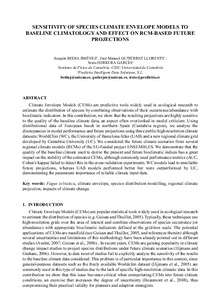Por favor, use este identificador para citar o enlazar este ítem:
http://hdl.handle.net/20.500.11765/8337
Sensitivity of species climate envelope models to baseline climatology and effect on RCM-based future projection
Registro completo de metadatos
| Campo DC | Valor | Lengua/Idioma |
|---|---|---|
| dc.contributor.author | Bedia, Joaquín | es_ES |
| dc.contributor.author | Gutiérrez Llorente, José Manuel | es_ES |
| dc.contributor.author | Herrera García, Sixto | es_ES |
| dc.date.accessioned | 2018-01-25T07:29:15Z | - |
| dc.date.available | 2018-01-25T07:29:15Z | - |
| dc.date.issued | 2012 | - |
| dc.identifier.citation | Rodríguez Puebla, Concepción; Ceballos Barbancho, Antonio; González Reviriego, Nube; Morán Tejeda, Enrique; Hernández Encinas, Ascensión (eds.). Cambio climático. Extremos e impactos. Madrid: Asociación Española de Climatología, 2012, p. 735-745 | es_ES |
| dc.identifier.isbn | 978-84-695-4331-3 | - |
| dc.identifier.uri | http://hdl.handle.net/20.500.11765/8337 | - |
| dc.description | Ponencia presentada en: VIII Congreso de la Asociación Española de Climatología celebrado en Salamanca entre el 25 y el 28 de septiembre de 2012. | es_ES |
| dc.description.abstract | Climate Envelope Models (CEMs) are predictive tools widely used in ecological research to estimate the distribution of species by combining observations of their occurrence/abundance with bioclimatic indicators. In this contribution, we show that the resulting projections are highly sensitive to the quality of the baseline climate data, an aspect often overlooked in model criticism. Using distributional data of European beech in northern Spain (Cantabria region), we analyse the discrepancies in model performance and future projections using three public high-resolution climate datasets: WorldClim (WC), the University of Barcelona Atlas (UAB) and a new regional climate grid developed by Cantabria University (UC). We considered the future climate scenarios from several regional climate models (RCMs) of the EU-funded project ENSEMBLES. We demonstrate that the quality of the baseline climate used to derive the present and future bioclimatic indices has a great impact on the stability of the estimated CEMs, although commonly used performance metrics (AUC, Cohen’s kappa) failed to detect this in the cross-validation experiments. WC models lead to unreliable future projections, whereas UAB models performed better but were outperformed by UC, demonstrating the paramount importance of reliable climate input data. | es_ES |
| dc.description.sponsorship | This research has received funding from the European Union’s Seventh Framework Programme (FP7/2007- 2013) under grant agreements 243888 (FUME Project) and 265192 (CLIMRUN Project) and from the CICYT project CGL2010-21869. | es_ES |
| dc.language.iso | eng | es_ES |
| dc.publisher | Asociación Española de Climatología | es_ES |
| dc.relation.ispartof | Publicaciones de la Asociación Española de Climatología. Serie A;8 | - |
| dc.rights | Licencia CC: Reconocimiento CC BY | es_ES |
| dc.subject | Fagus sylvatica | es_ES |
| dc.subject | Climate envelope | es_ES |
| dc.subject | Impacts of climate change | es_ES |
| dc.subject | Species distribution modelling | es_ES |
| dc.subject | Regional climate projection | es_ES |
| dc.title | Sensitivity of species climate envelope models to baseline climatology and effect on RCM-based future projection | es_ES |
| dc.type | info:eu-repo/semantics/conferenceObject | es_ES |
| dc.rights.accessRights | info:eu-repo/semantics/openAccess | es_ES |
| dc.relation.projectID | info:eu-repo/grantAgreement/EC/FP7/243888 | es_ES |
| dc.relation.projectID | info:eu-repo/grantAgreement/EC/FP7/265192 | - |
| Colecciones: | (2012, Salamanca). VIII Congreso AEC | |
Ficheros en este ítem:
| Fichero | Descripción | Tamaño | Formato | ||
|---|---|---|---|---|---|
| 0071_VIII-2012-J_BEDI... | 1,34 MB | Adobe PDF |  Visualizar/Abrir |
Los ítems de Arcimis están protegidos por una Licencia Creative Commons, salvo que se indique lo contrario.





